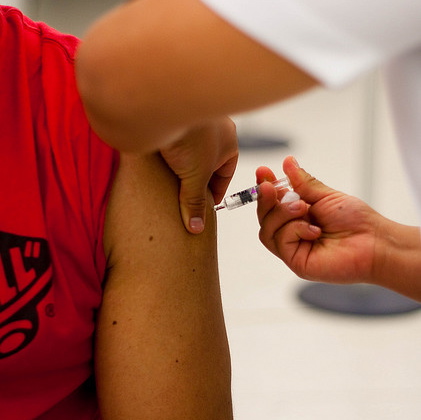
California appears to be getting a handle on pertussis, one year after a new vaccination law went into effect.
The highly contagious disease, better known as whooping cough, killed ten infants in the state in 2010 and infected 9,000 people: the most in 60 years.
But California hasn’t seen a single death from the disease in 2011 or in the first half of 2012, according to a recent report by the California Department of Public Health (CDPH). The last time California had an entire year without pertussis deaths was 1991. The CDPH says that the disease is at a historic low – with an incidence rate of less than one case per 100,000 as of April 2012.
That’s more than seven times lower than the national rate, according to the Centers for Disease Control (CDC).
Dr. Ron Chapman, the director of the CDPH, credits a huge effort by California’s public health officials, school districts and community clinics to get kids vaccinated. “Greater awareness of the disease, more rapid diagnosis and treatment, and increased vaccination rates contributed to saving the lives of infants.”
Other states aren’t faring so well in the battle with pertussis. The CDC reports that Wisconsin, for example, is deluged with patients – it has a whopping 67.5 cases per 100,000 people. The U.S. as a whole saw more than 25,000 cases of pertussis and 13 deaths in 2012, as of last month.
School districts like Coachella Valley Unified (just south of Palm Springs) held multiple free immunization clinics over the summer- including one just days before school began. They’ve seen a major drop in the number of families using those clinics this year compared to 2011, when the law first went into effect. Last year, they targeted all students between 7th and 12th grades. This year, they focused on 6th graders and students new to the state.
“We saw over a thousand students last year for the vaccine and this year we’ve seen about 200,” said Mary Ramirez, Program Coordinator with Clinicas de Salud Del Pueblo – the clinic that partnered with the school district to offer the free immunizations.
The law now states that kids in the 7th through 12 grades have to get the Tdap booster shot (which covers tetanus, diphtheria and pertussis) in order to start school. Most kids get an initial series of shots before age 7, but studies show the protection wears off in about five years, just as kids are entering the 7th grade.
Pertussis causes a painful cough that can last for months, especially in babies who are too young to be vaccinated. Teresa Nicolle, a longtime school nurse at CVUSD, says, “It’s to prevent children from infecting their younger siblings and also the elderly who are at high risk of disease and death. So as long as our population is vaccinated properly it’s a preventative measure, not only for the community but for the students as well.”
Harried parents are grateful for the free immunizations. Liliana Alvina, from Indio, brought her two boys into the free clinic after her pediatrician turned them away. “I did take them to the doctor’s office and they didn’t have any vaccine at the moment. So this is great. I know they need it. If they can’t go to school then I can’t go to work!”
Maria Rios Gambon and her three kids just moved to town from Rialto – an hour away. She brought the kids to the free clinic on the first day of school because her new pediatrician was booked up for the next two months. “This is great. I went to the Mecca Clinic and they sent me here, ” Maria says.
Lupe Garcia Torres recently brought his four kids to the U.S. from Mexico after waiting two years to get their immigration papers.
“It’s great. It helps a lot. We tried to make appointments in other clinics. The kids would have been kept out of school for two weeks without the immunizations,” she says. “Luckily I went to the Clinicas de Salud del Pueblo in Coachella, and they told me about this free immunizations. Otherwise we wouldn’t have known.” According to the CDC, Tdap boosters are not generally recommended in Mexico.
The booster shots are not just for students. The CDC recommends that all adults who live or work with infants and the elderly get the Tdap shot to stop the spread of pertussis.





